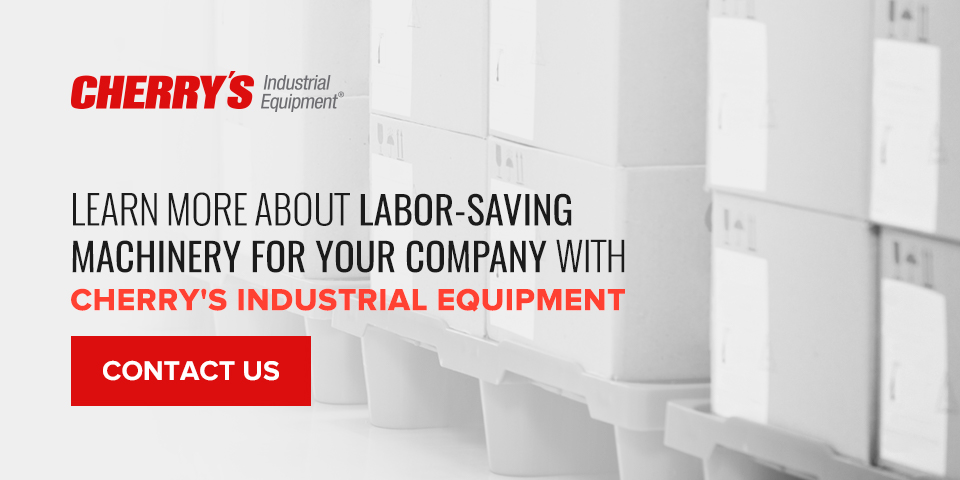Manufacturing in the Age of COVID-19 — Labor Savings
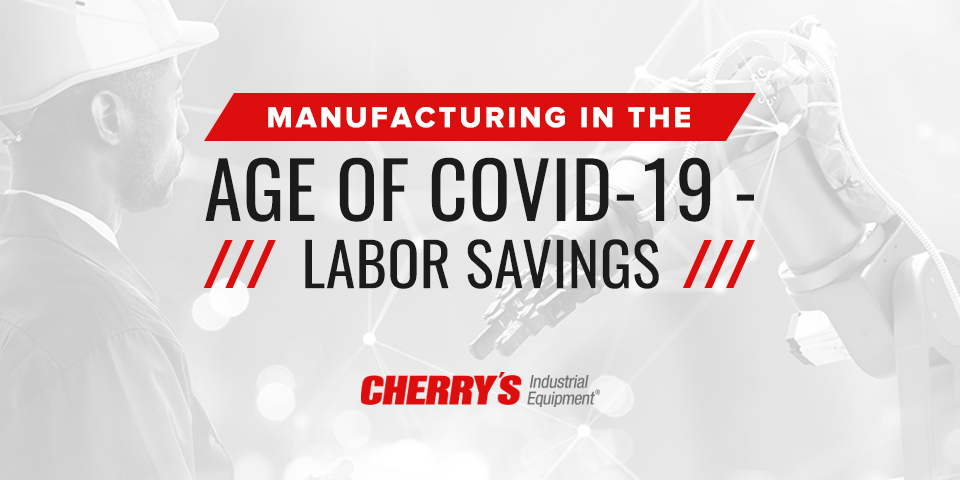
With COVID-19 impacting the workforces of countless industries and companies, the need for occupational safety and health is bigger than ever before. As a result of coronavirus safety measures or workers getting sick, companies may have fewer workers available to complete important tasks in a timely manner that clients have come expect. Many companies in the manufacturing sector are turning to labor savings machinery to keep up with demand and combat the loss of productivity that comes from a diminished workforce.
Jump To Sections:
- The Importance of Efficient Manufacturing Companies
- The Efficiency Impact of COVID-19 on Manufacturing Companies
- What is Labor Savings?
- Benefits of Labor Savings
- We Can Make Labor Savings Possible for Your Company
- How to Anticipate Future Risks
- Contact Us to Learn More About Labor-Saving Machinery for Your Company
Automated machines provide the critical infrastructure workers need when times are hard and fewer people are available to complete the tasks needed to keep up with their clients’ expectations. As COVID-19 continues to change the way companies operate, learn more about how labor savings machinery can keep your operations running smoothly during this time and even improve your efficiency.
The Importance of Efficient Manufacturing Companies
Manufacturing companies are crucial to the health of the economy and the ability of companies and organizations to provide products to individuals. The manufacturing industry is also a major source of jobs in the United States. The U.S. manufacturing sector’s ability to produce goods and get them to consumers all around the world is a crucial component of a strong economy and a nation’s well being. As such, efficient manufacturing companies are needed to get products in people’s hands in good condition and as fast as possible.
The manufacturing industry also plays a critical role in producing personal protective equipment (PPE) for medical professionals on the front lines of the coronavirus emergency response. Many manufacturing facilities have started to produce protective equipment for hospitals and other medical facilities that are crucial in these times. Manufacturers who produce PPE need to be as efficient as possible to keep those working in healthcare well-stocked.
Even companies who don’t produce PPE are important to the nation at this time, as they provide consumers products that make their lives better and keep their spirits high. People need food, toiletries and a variety of other products produced or stored in manufacturing facilities. Efficiency is important to these companies to keep their consumer base happy and to help people feel a sense of normalcy.
Manufacturing companies, whether they’re producing PPE or other products, need to take the time to improve their capabilities. Deciding to close down because they don’t have enough staff to complete the orders coming into their facility shouldn’t be an option. Closing down will harm the workers who are still able to work and hurt the customer who may need their products to stay happy and healthy during the coronavirus.
Since closing down due to coronavirus can be devastating to workers, consumers and the economy as a whole, it’s crucial for companies to invest in efficient labor-saving machinery. Whether it be using tech to better organize your warehouse or using sanitary pallets to prevent the spread of disease, businesses can improve their efficiency in several different ways. When a manufacturing company invests in technology and other storage solutions, it improves the lives of consumers and workers all around the country.
The Efficiency Impact of COVID-19 on Manufacturing Companies
COVID-19 can cause some major changes to the efficiency of a manufacturing company. Without the appropriate pieces of tech and equipment to minimize the challenges coronavirus poses to companies and workers, a manufacturing company can significantly fall behind in terms of efficiency. Some of these negative coronavirus effects range from a limited labor force to overworking outdated equipment.
Find out more about the top ways the coronavirus is impacting the efficiency of manufacturing companies:
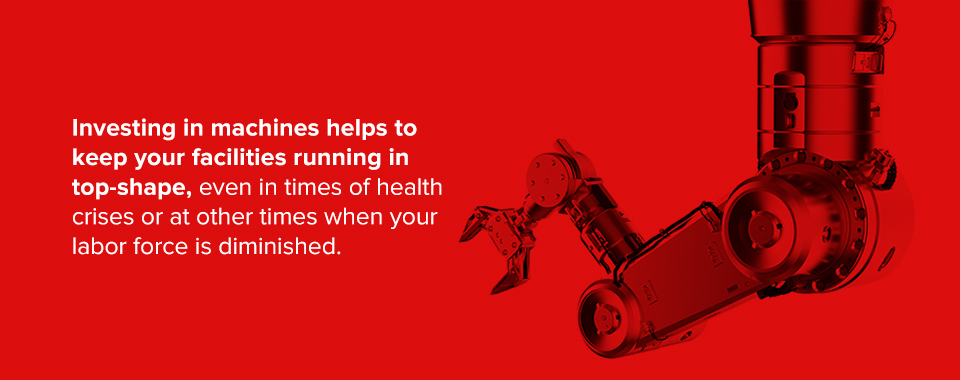
Limited Labor
If workers at your manufacturing company come down with COVID-19, your labor force can be severely restricted. Employees with the coronavirus will need time to recover from it and make sure they’re no longer contagious before coming back to work.
While employees recover, you’ll have less of a labor force to rely on to finish your company’s daily tasks. Without automated equipment at your warehouse, losing a portion of your workforce to sickness can heavily impact your ability to complete your responsibilities. Processes that require manual labor or a lot of input from users will be especially hampered and can cause a company to fall behind in their targets.
Besides limited labor due to your essential workers being out on sick leave, there are other labor supply issues that come from coronavirus. For example, manufacturers that are used to having employees working close together have probably had to implement social distancing at the workplace. At times, this can mean you can’t have as many people working at the same time, meaning you’ll have to reduce your labor force, leading to inefficiency.
However, a limited labor force doesn’t mean you have to accept inefficiency. There are many labor-saving machines on the market today that reduce the amount of staff needed to complete processes by automating a variety of tasks that once relied on physical labor. Investing in these machines helps to keep your facilities running in top-shape, even in times of health crises or at other times when your labor force is diminished.
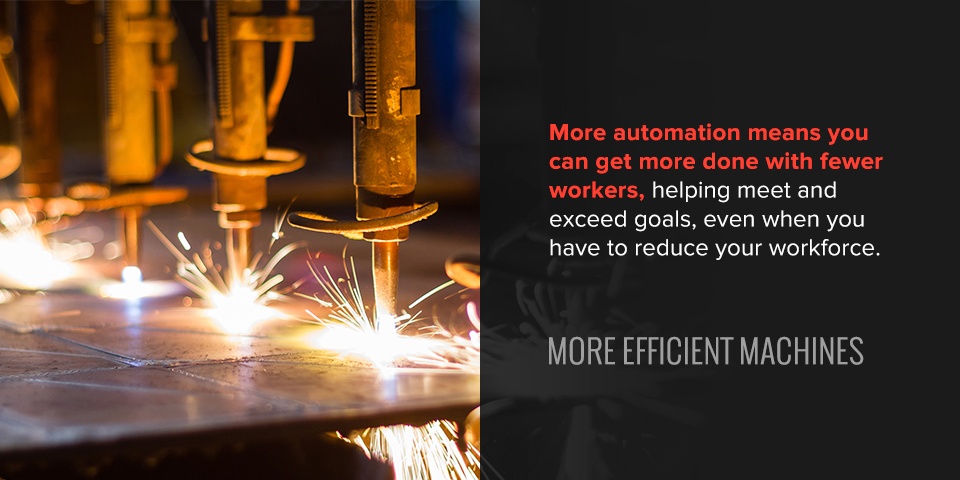
Non-Efficient Machines
Having less staff at your business either due to sickness or social distancing restrictions can have an especially negative impact on your company’s efficiency when you don’t have updated machinery to back you up. Non-efficient machinery puts your company at risk of falling behind targets and losing clients while you have a diminished workforce.
For example, older manufacturing machines can require more manual input from workers than newer machines. Additionally, they also could require more workers to use them or to maintain them after use. These machines may have been acceptable in times where you had more staff available to rely on, but in the time of a pandemic, the flaws of these machines will likely be more pronounced and stop you from hitting your goals.
To combat this loss of efficiency, many companies invest in cutting edge manufacturing technology to ensure they can still hit their targets and fulfill client expectations. Many of these new machines reduce the number of people who have to interact with them to work properly and automate as many of the machine’s processes as possible. More automation means you can get more done with fewer workers, helping meet and exceed goals, even when you have to reduce your workforce.
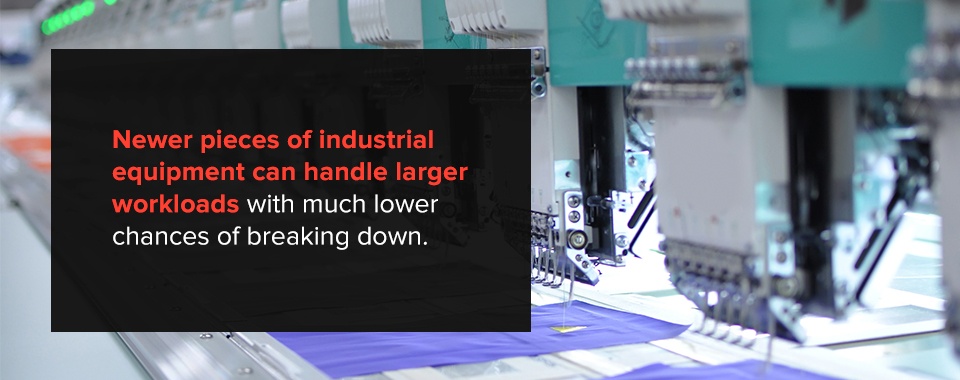
Overworking Machinery and Employees
When your machinery is not as powerful as it could be and your labor force is reduced, you may run into the problem of having to keep up with demands that your workers can’t meet within normal work hours. This increased workload can lead to having to pay workers overtime to get everything done.
Besides the impact of having to pay more to complete your work, overworking employees at the front lines can lead to more accidents and mistakes in the manufacturing process. When people are overworked, having to meet targets that they’ve never had before, it’s likely there will be more mistakes as they try to work faster than they possibly can. Overall, overworking your employees harms your bottom-line, generates mistakes and puts too much stress on your essential business workers.
Alongside the negative effects of overworking employees, over-relying on older machines to get work done can cause major inefficiency issues. As you may have to use your machines more to compensate for the lack of staff present, older machinery will be more likely to experience durability issues. Overworking them can cause them to break down or experience maintenance issues that, due to your limited staff, may take longer than normal to fix.
Newer pieces of industrial equipment can handle larger workloads with much lower chances of breaking down. As such, many companies choose to invest in cutting-edge machinery to mitigate the negative effects that overworking can have.
What Is Labor Savings?
Labor savings refers to an idea or device that helps people complete tasks with less effort than would normally have to be put forward. In a manufacturing context, labor savings can refer to the machinery that helps reduce the amount of effort and manual labor that your employees have to exert to complete their tasks.
In a time where labor and efficiency are especially impacted by a global pandemic, it’s crucial to have the best machines and industrial equipment in your corner. When you have a limited workforce but still need to keep up with your demand, you need to have critical infrastructure at your back to keep your business running smoothly.
By implementing labor-saving machines and other kinds of industrial equipment around your workplace, you protect yourself against health crises. You also set your company up for future successes, as the machinery can allow you to exceed expectations and hit targets that you were never able to hit before, even with a full labor force. Some example of labor-saving technology includes:
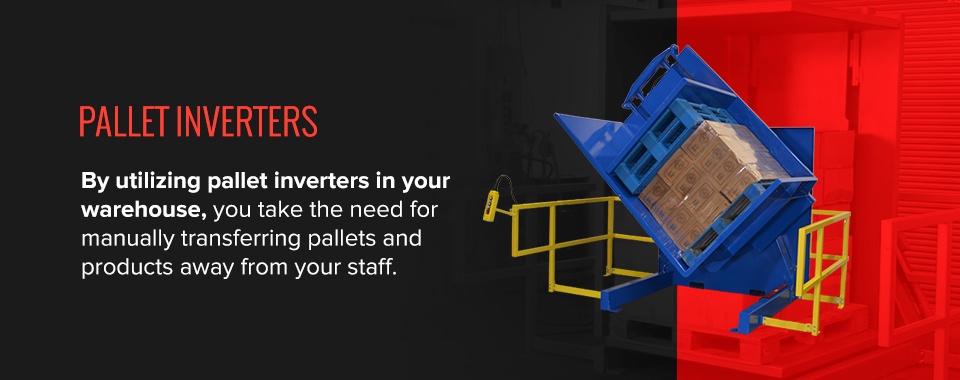
1. Pallet Inverters
Pallet inverters are perfect for times when your pallets need to be moved. Essentially, a pallet inverter takes away the need for workers to manually stack and re-stack items and products. The machinery rotates at 180 degrees to make pallet transportation and exchange simple and fast. You can choose from several different pallet exchangers and inverter styles to meet your exact specifications.
By utilizing pallet inverters in your warehouse, you remove the manual handling of load transfers from your operation. This labor-saving machinery saves time and controls your costs. Additionally, it benefits you by reducing workplace injuries that come from workers having to move pallets by hand. As a result of taking away the need for workers to manually transfer pallets, you can reduce the chances of user error that leads to product damage.
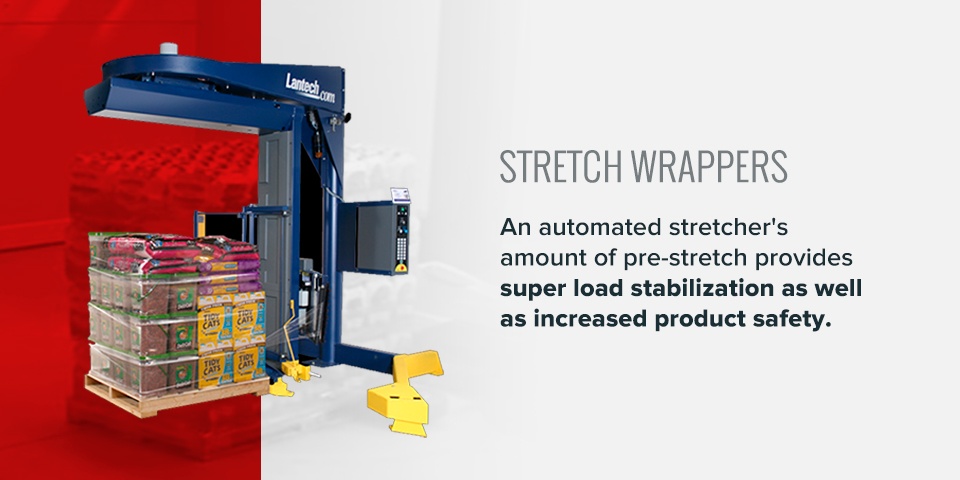
2. Stretch Wrappers
Automating the wrapping process of pallets and products can be a huge time-saving effort that frees up your staff for other duties. Additionally, the machinery utilizes stretch film that has 200% pre-stretch, which is much better than the film used in traditional hand methods, as it only has a pre-stretch film of 10%. An automated stretcher’s amount of pre-stretch provides super load stabilization as well as increased product safety.
Compared to wrapping by hand, entry-level models can even reduce the amount of film used by up to 30%. By using these automated stretch wrappers, you end up saving costs on stretch wrapping, as well as reducing the need for staff to devote their time to wrapping pallets themselves.
3. Lift Tables
Improving both productivity and safety is always welcome in a manufacturing facility. For instance, workers run a greater risk of injury when they spend extended periods of time reaching and bending as they manually stack product onto pallets or remove product from pallets. To reduce such manual exertion pallets need to be placed at an ideal height to ensure that workers can palletize with ease. Lift tables do this by helping to position pallets at the best heights and angles for a worker’s needs. They are easy to operate and take much of the grunt work from employees.
As labor-saving devices, tasks such as palletizing become a more comfortable and faster process. Additionally, they reduce the risk of injury and workers’ compensation claims. You can find multiple styles that serve different ends, such as floor level lift tables for ground-level access to pallets and high-level lift tables for times when you need to raise pallets to high locations.
4. Pallet Retrievers
Retrieving pallets by hand can require a great deal of staff in order to do it safely. Pallet retrievers make the process faster and safer, and they cut down on the number of staff needed to retrieve pallets safely. In times where staff are out sick, these easy-to-operate machines can be a lifesaver when you need to increase output.
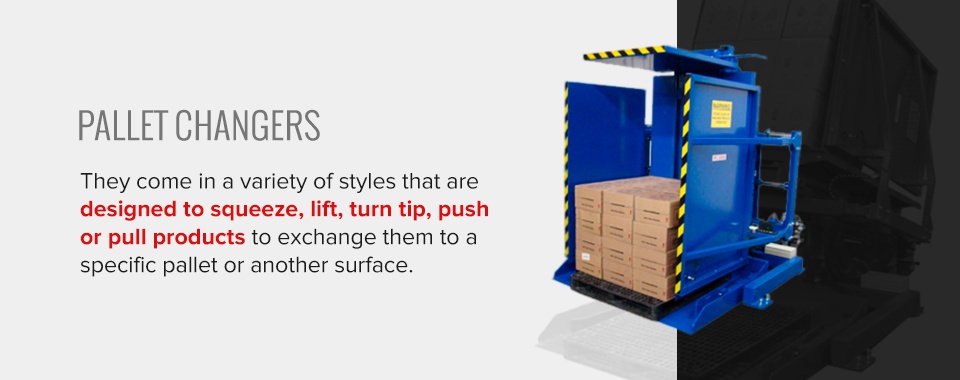
5. Pallet Changers
Automatic pallet changers are a type of machine that assists with load transfers from hygienic pallets to wood or vice versa in a safe manner. Pallet changers come in a variety of styles that are designed to squeeze, lift, turn tip, push or pull products to exchange them to a specific pallet or another surface.
By using pallet changers, companies can improve their efficiency. As a machine that assists with material handling, it can assist with reducing waste and redundancy, while also cutting back on the manpower needed to complete load transferring tasks throughout your facility. These automatic pallet changers are also very easy to use, meaning you can implement them quickly to keep up with demand.
Benefits of Labor Savings
With labor savings machinery available to a variety of industries, companies can combat the hardships placed on them due to the coronavirus by investing in industrial equipment and machinery. From providing your company with more reliable labor to reducing the stress placed on employees, labor savings equipment is perfect for forward-thinking companies that want to meet the coronavirus head-on and set themselves up for success after things get back to normal.
With labor-saving equipment, you may even be able to increase your productivity in the midst of a fluctuating economy and workforce. These machines are designed to take responsibilities off of your staff’s shoulders and help them handle tasks with greater efficiency. Find out more about the many advantages of labor savings machinery below:
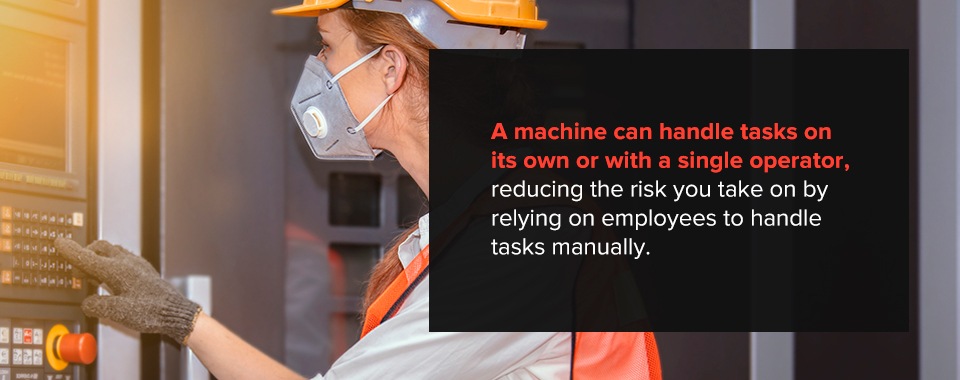
1. Reliable Labor
Labor-saving technology gives you the benefit of not having to worry about user error that could lead to damaged products and inefficiencies that slow your work processes down. Automated machinery designed for your industry will make sure that various tasks get done quickly and in the proper manner, without having to rely on much, if any, manual inputs from users. The automatic nature of these machines means that you can expect your products to have a consistent level of quality.
Alongside reducing the chances of user error that could end up harming products, machinery has the advantage of being immune to sickness or having to take any sort of annual leave. When you rely on staff to complete various tasks, your business could come to a grinding halt if there’s an outbreak of coronavirus at your plant or facility. A machine can handle tasks on its own or with a single operator, reducing the risk you take on by relying on employees to handle tasks manually.
This isn’t to say, however, that the equipment totally eliminates the need for your employee. Instead, it frees them up to conduct other tasks that still require a personal touch and lets them control machinery that helps them do their jobs with greater consistency. Your employees will appreciate the easy-to-use machinery that reduces the chances of them making an error. Additionally, your company will benefit from more reliable labor and finished products.
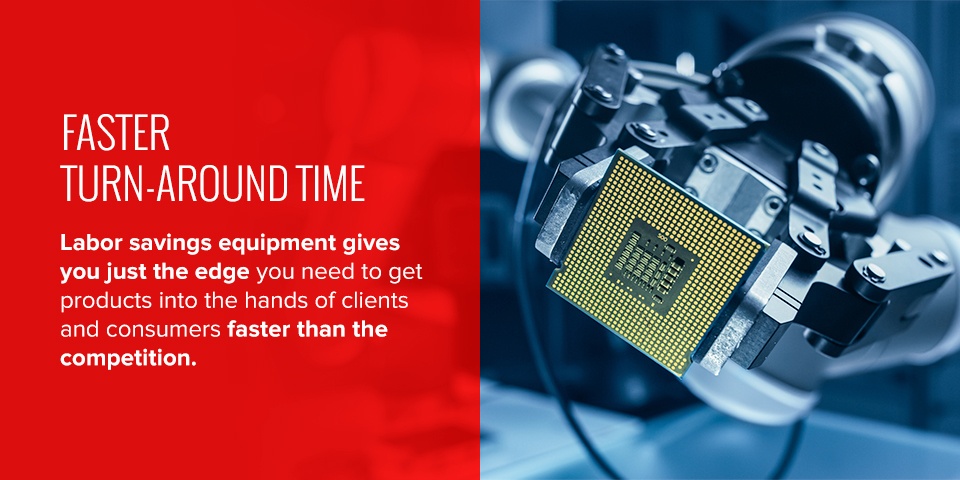
2. Faster Turn-Around Time
Relying on manual labor or clunky, non-intuitive machinery to complete tasks around your facility is a recipe for slow-downs in productivity. Safety restrictions that limit the number of people inside your building at a time due to the coronavirus, for example, could slow down your operations considerably. Additionally, if a worker unknowingly spreads the virus to others, you may lose a chunk of your workforce while they all recover, reducing the capabilities of your company to hit targets.
With the latest industrial equipment that’s designed with labor savings in mind, you can minimize the risk of slow down due to the coronavirus disease and other kinds of factors that might cause a company to have to reduce workers and slow production. These updated machines are designed to complete jobs with greater speed and with little user input. Even when you have to adjust to fewer staff members, these machines can help you keep up with the demands.
As the competitive nature of the manufacturing sector demands fast turn-around time, virus or not, the best companies are always looking for a way to gain an edge over the competition. Labor savings equipment gives you just the edge you need to get products into the hands of clients and consumers faster than the competition. Instead of having to hope your staff can meet the promises you give to clients, you can be sure that a piece of manufacturing equipment will complete a job quickly.
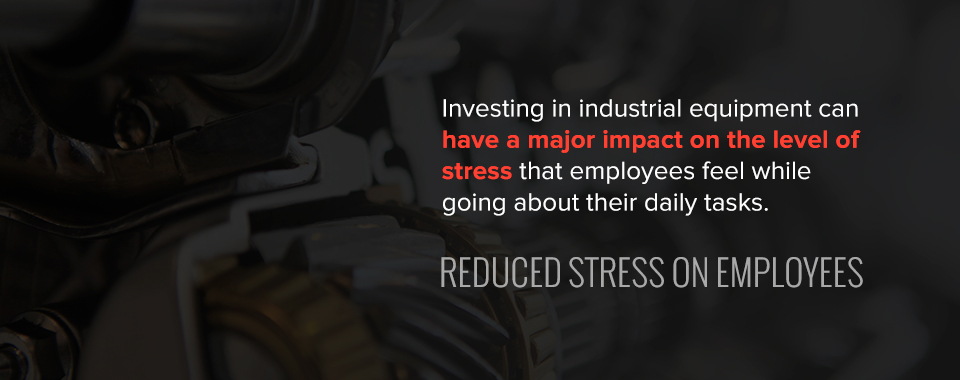
3. Reduced Stress on Employees
Protecting workers is another primary benefit of implementing labor-saving industrial equipment throughout your manufacturing facilities. When critical members are out due to sickness, or you have to reduce staff in response to the global financial crisis, your remaining staff are often given more work than they can handle. This can be especially stressful for them and reduce their workplace happiness. If your workplace becomes a place of stress, it’s unlikely that they’ll be able to operate at the highest quality standards.
Besides stress harming the quality of work being done by employees, it also leads to discontentment in your workforce. This discontentment can lead to experienced staff quitting to find another position, along with reducing the motivation of your staff who do stay to come into work every day.
Reducing stress helps to keep your employees from feeling overwhelmed and unhappy at work. Investing in industrial equipment can have a major impact on the level of stress that employees feel while going about their daily tasks. These automated machines reduce the amount of time-consuming and difficult tasks that staff members have to complete each day to keep up with warehouse goals. Instead of constantly feeling behind, these machines will give employees plenty of breathing room.
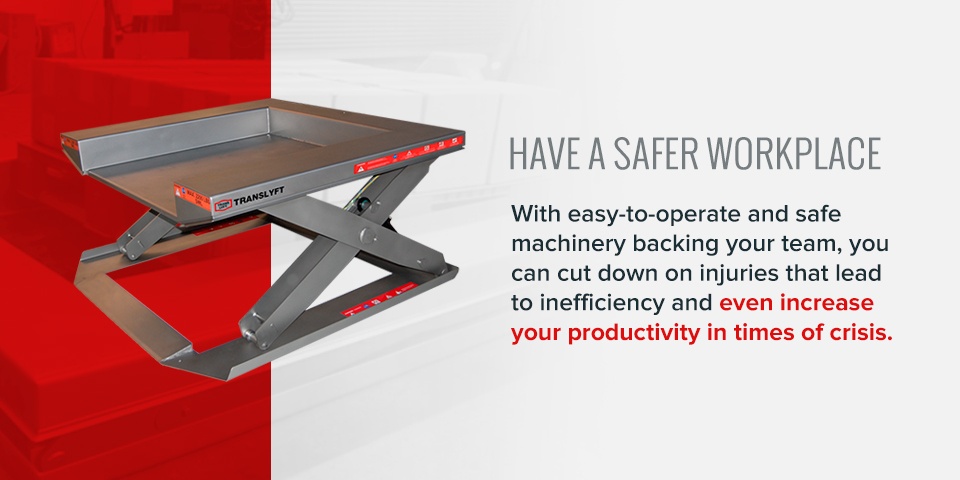
4. Safer Workplace
It’s important to ensure that you develop a safe workplace for your employees to come into week after week. Safety doesn’t just mean meeting the Department of Labor regulations — it is crucial for ensuring that your productivity and efficiency aren’t negatively impacted by public health crises like the coronavirus.
In the manufacturing sector, physical labor can lead to serious injuries, as workers attempt to haul heavy pallets and products from one place to another. Handling older machinery can also be dangerous for workers since these older models might not have as many safety guards built into them. Accidents can lead to workers being out for a long time and costly lawsuits. Labor-saving equipment ensures that workers are not put in a place where they’re susceptible to injury.
Labor-saving machinery can help prevent injuries caused by user error or poor machinery design, and they can also be designed in a way where they prevent long term injuries sustained by poor posture. Custom machinery that’s designed with ergonomics in mind will be a much better option for workers, helping them stay in the correct postures while operating machinery and keeping them from developing injuries over time.
Equipment can also be used to promote a more hygienic workplace, which is crucial for warehouses that handle food products, pharmaceuticals and medical equipment. Stainless steel lift tables and plastic pallets are easy to clean, making them ideal for times when you’re handling products that are more susceptible to contamination. Additionally, easy-to-use industrial equipment can also keep your warehouse hygienic and free from contamination that could end up making its way to your consumers, putting their health at risk.
In the end, a safer workplace is a more productive workplace, with fewer people having to recover from injuries or stay home due to sicknesses spreading at your facilities. With easy-to-operate and safe machinery backing your team, you can cut down on injuries that lead to inefficiency and even increase your productivity in times of crisis.
5. Greater Chance for Profit and Cost Savings
Investing in labor-saving machine equipment is a major decision, but it’s well worth it. By investing in the latest equipment, you can save money in the long run and increase your profit margins.
While some people put off investing in new equipment due to the upfront costs, this can actually cause companies to lose money over time. Companies that continue to rely on their old machines can end up losing money due to maintenance costs, missed opportunities with potential clients who need greater productivity and lost efficiency in times when staff members are out with coronavirus and other sicknesses. Over time, these losses will become even more pronounced as other companies invest in labor-saving machines.
Machinery helps your workers complete tasks with greater efficiency, resulting in more products into the hand of clients and consumers. This extra productivity can lead to greater profits and make you a leader in your industry. Greater profits also mean you can make back the money used to invest in the machinery and see a fast return on investment.
Additionally, investing in machine safety equipment can guard a company against costly lawsuits. If your workers sustain injuries due to outdated equipment or an unsafe environment, you may be on the hook for workers’ compensation claims that could put a major strain on your bottom line. Instead of risking this, you can save your money by investing the safest labor-saving equipment around to prevent these expenses.
We Can Make Labor Savings Possible for Your Company
Cherry’s Industrial Equipment provides top quality labor-saving solutions to companies all across the manufacturing sphere. We can work with virtually everyone. No matter your manufacturing niche, we have the ability to provide solutions that provide labor savings as well as greater hygiene at your manufacturing facility.
As a company, we take great pride in developing custom solutions for our clients, and in these times, we’re devoted to helping companies make the best of it during this pandemic and come out on the other end looking stronger than before. If you’re still unsure if Cherry’s Industrial Equipment is the right company to partner with, consider some of the ways we’ve assisted clients who needed custom solutions in the past:
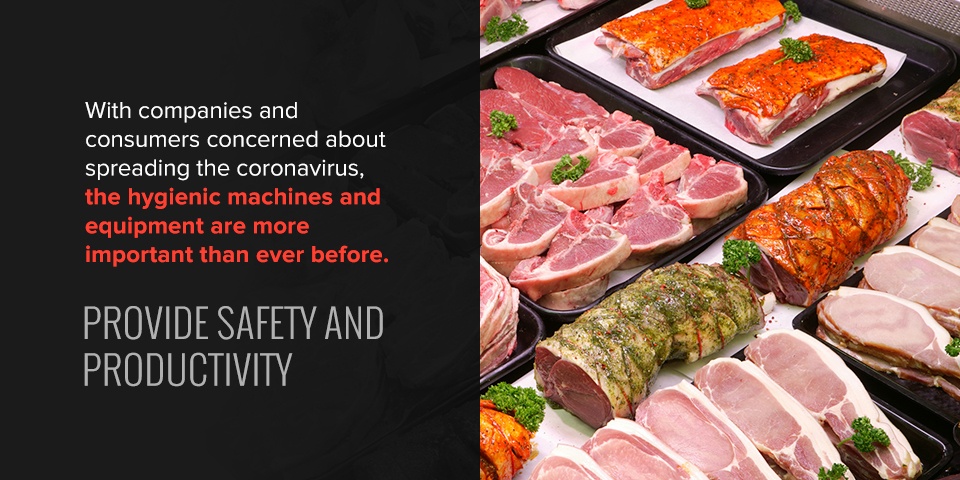
Meat Company in Minnesota
One of our biggest success stories came when we worked with a meat company in Minnesota to provide greater safety and increased productivity. When the client asked for these exact qualities in some of the equipment they were hoping to add to their facilities, we knew that we could help.
The problem that Cherry’s was presented with was that one of the company’s main processes involved the manual tipping of stainless-steel vats. This process was typically considered unsafe, so careful attention was given to make sure vats were tipped as safely as possible. While this process was effective at increasing the safety of workers and products, it slowed their ability to complete the task quickly, causing a loss to productivity.
Cherry’s provided a custom stainless-steel formal proposal that was labor-saving, increasing both the safety and productivity of the company’s daily tasks. The machinery we custom made came in a form that met the company’s specifications and hygienic demands. The customer claimed that the solution checked all of the boxes they needed and gave them more advantages than they could have expected.
Other manufacturers in the meat, poultry and seafood industry trust Cherry’s for their needs. As product debris and contamination can harm meat and spread disease, those in the industry can benefit from labor-saving automatic machinery that reduces the chances of disease spreading due to mistakes that come from having staff have to manually handle meat. With companies and consumers concerned about spreading the coronavirus, these hygienic machines and equipment are more important than ever before.
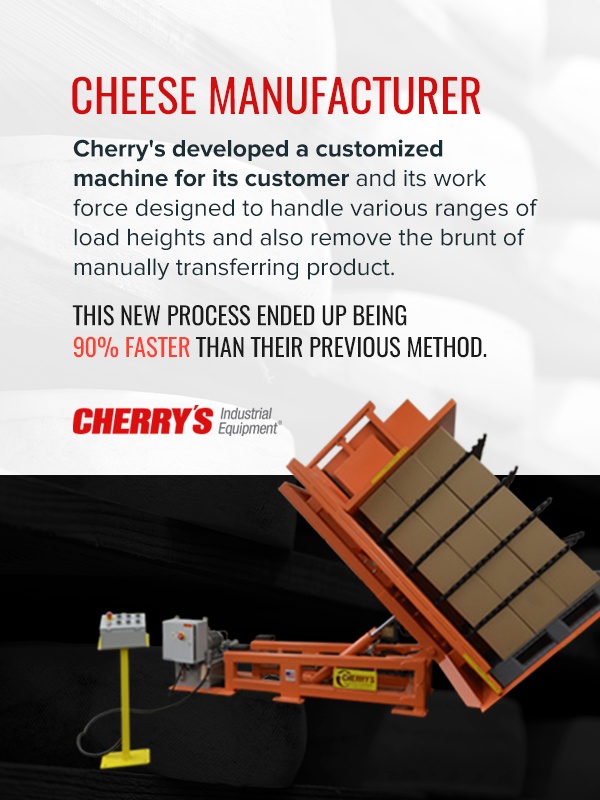
Cheese Manufacturer
Another client we’ve worked with was a cheese manufacturer that was experiencing a problem born out of their company’s success. The company was experiencing a high demand for their products overseas, which, on most days, is excellent news for a company. However, they couldn’t keep up with this demand due to not having enough labor to handle the product and get it to their clients in time.
On the one hand, they were happy to have the extra demand and the opportunity to expand into new markets. On the other hand, they were concerned that their lack of labor power could prevent them from shipping their products, potentially harming client relationships and reducing the money they could be making by having to turn down potential buyers.
One of the primary ways that the company’s productivity was hampered was by having to manually transport each case of product onto pallets certified for export. This manual process for shipping ended up being extremely time-consuming, labor-intensive and injury-causing. Additionally, the cheese company experienced schedule conflicts, daily worker shortages and worry of exhausting the front-line staff as hiring/training issues worsened due to workers’ unwillingness to do the potentially dangerous type of manual labor.
At Cherry’s, we knew that we could make a difference and help this company improve their processes and meet the growing demand for their exceptional product. Cherry’s developed a customized machine designed to handle the range of load height and take the brunt of the transportation process away from their workers.
This PSR machine topped the load on the side, so the operator could change out the pallet quickly. This new process ended up being 90% faster than their previous method. The increased speed was crucial for their ability to hit targets, and the extra output offered them the ability to work with more clients.
Besides this custom solution for this specific manufacturer, there are tons of products that assist those in the cheese and dairy industry. Hygienic export pallets, lift tables and 90-degree tippers and upenders are all some of the best manufacturing equipment that regularly helps those in the cheese industry and the food service industry as a whole.
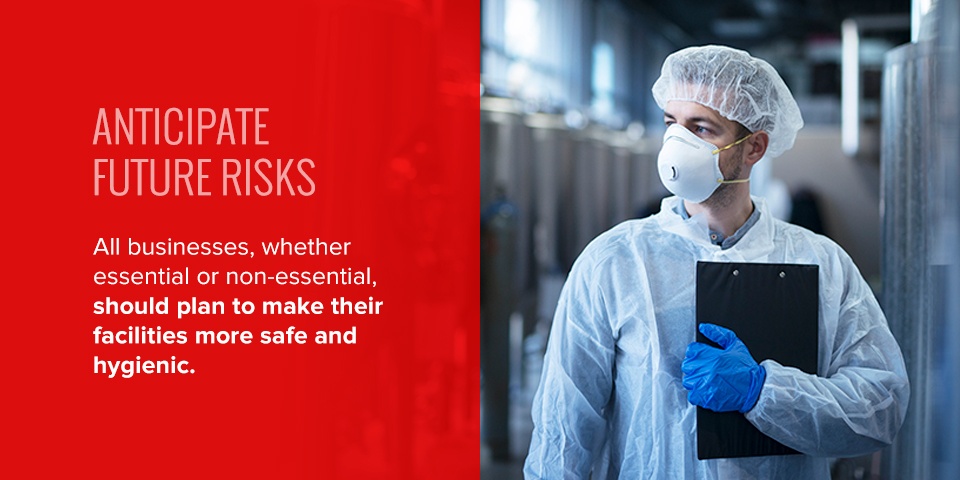
How to Anticipate Future Risks
As you move forward as a company, you need to look to the future to help you guide your purchasing decisions today. For example, tons of forward-thinking companies are protecting themselves against labor-shortages and maintenance issues by buying spare machinery that can be a back up for times when efficiency could be majorly impaired by the loss of labor or a machine breaking down. These backup machines are most popular amongst essential businesses that, for the good of the country, workers and employers, can’t shut down.
Non-essential businesses that have had to shut down due to coronavirus restrictions are also beginning to plan ahead for reopening. Some manufacturers will go from not producing any products to suddenly having sky-high demand that they’ll need to meet. As a result of this expected demand, non-essential businesses should look to purchase machinery that can increase their company’s productivity while also taking some of the responsibility off of their staff’s shoulders.
All businesses, whether essential or non-essential, should also plan to make their facilities more safe and hygienic. Employees will be more hesitant to work for companies that don’t take steps to protect them from disease, and consumers will also want the companies that supply them to be as careful as possible, so they don’t get sick from products.
It’s also crucial to take preventative measures that ensure the impact of something like COVID-19 doesn’t have a negative impact on your business the way it might have this time around. One of the primary ways to set your company up for future success and greater security is by working with an industrial equipment supplier who can craft custom solutions for your business.
Contact Us to Learn More About Labor-Saving Machinery for Your Company
When you’re looking to adjust to the demands of coronavirus, you should work with a company that can recognize your needs and deliver solutions that meet those needs. Cherry’s Industrial Equipment is that kind of company. We’ve worked with countless companies in a variety of manufacturing industries, and we’re ready to help you meet the challenges posed by the coronavirus, with innovative and safe solutions.
Contact us today to learn more about our resources and information about labor-saving machinery and custom solutions.
